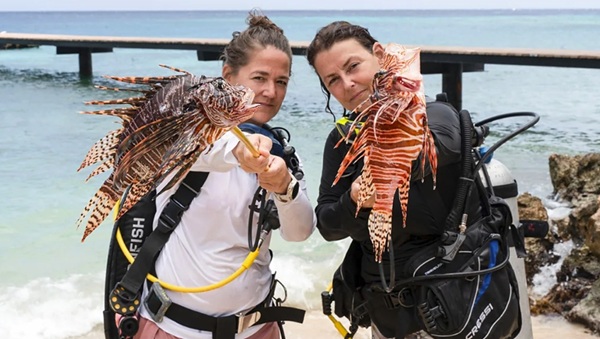

Thinking about invasive species in the Caribbean and creative solutions to tackle the problems, we decided to share excerpts from a BBC Travel article of 17 February 2025. Lisa Collins-Haynes focuses on how “two women [in Curaçao] are working to save the coral reef from the invasive lionfish, using it as a sustainable teaching tool and cooking it into everything from tacos to fish and chips.”
Curaçao is facing an ecological challenge: the invasive lionfish. The venomous lionfish have brown, red and white zebra-like stripes, fleshy tentacles and long, fan-like fins. They are native to the South Pacific and Indian Oceans, but sometime in the late 1980s they were introduced to the warm tropical waters off Florida’s Atlantic Coast. Although the exact cause of this is unknown, it’s theorised that they were released from marine aquariums. By the early 2000s, they had reached the Caribbean coastline and Curaçao ‘s coral reef, where diving significantly contributes to the local economy and employment.
Lionfish are not a welcome species anywhere because they reproduce at an alarming rate; females release about two million eggs per year and as they grow, they eat smaller native fish and marine life that protect coral reefs. This behaviour creates an imbalance that disrupts the reef’s ecosystem. The presence of lionfish impacts both diving tourism and the commercial fishing industry, with research showing that even in a short period of time, the presence of lionfish can reduce a native reef fish population by 79%.
But what is problematic has become a catalyst for innovative adaptation and environmental responsibility. Through food, art and education, the unique but complicated relationship between Curaçao and its lionfish is being tackled by two local women, Helmi Smeulders and Lisette Keus.
Smeulders left her law career in the Netherlands in 1998 and relocated to Curaçao, eventually becoming a chef, diver and conservationist. But what did a lawyer-turned-chef know about hunting the invasive lionfish, sustainable fishing and the importance of protecting the reef for future generations? Turns out not much, until she teamed up with local diver Keus, who taught Smeulders (along with other women on the island) how to find and capture the lionfish to help save the coral reef. “I showed [chefs] how to clean them, gave [them] recipes and gave batches [of the fish] for free to restaurants to practise with,” says Keus.
After coming across the fish during dives years earlier, Keus decided to dedicate herself to controlling its population. She excelled at catching it and became known as somewhat of a lionfish whisperer as she always seemed to know exactly where to find the elusive creature. In 2012, she started trying to sell the fish to restaurants.
At first it was a challenge. No one wanted to buy (or eat) the fish because they were believed to be poisonous (they’re actually only venomous; the fins on their back sting when touched and can cause swelling and pain). “Everyone was afraid of [the fish] and they didn’t know if it was safe to touch or eat,” she says. “I had my cooler full, but I found myself throwing pounds of fish back into the ocean because I couldn’t sell it. “
Keus devised a way to make the fish palatable to local chefs. “I explained that lionfish are an invasive species, so by cleaning it safely and serving it, they were actually helping to protect the local Curaçao ecosystem,” she says. [. . .]
Smeulders reached out to Keus and other divers with a request to catch as many lionfish as possible for the dinner. Then? “I did what I do best: I served a plate of small bites with a modern Caribbean flair,” she says. Her poached lionfish, prepared with a rich and buttery hollandaise sauce and hint of lemon, was the standout. Because lionfish is a white fish with a mild, delicate flavour that’s somewhere between cod and lobster (and a good source of omega-3 fatty acids) “it helped capture the essence of the island’s unique cuisine,” says Smeulders. [. . .]
For full article, see https://www.bbc.com/travel/article/20250214-the-fearless-lionfish-huntresses-of-the-caribbean
[Photo Credit: Charmed Life Photography-Lisa Haynes.]
Thinking about invasive species in the Caribbean and creative solutions to tackle the problems, we decided to share excerpts from a BBC Travel article of 17 February 2025. Lisa Collins-Haynes focuses on how “two women [in Curaçao] are working to save the coral reef from the invasive lionfish, using it as a sustainable teaching tool




